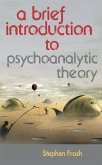Hamlet on the Couch weaves a close reading of Shakespeare's Hamlet with a large variety of contemporary psychoanalytic and psychological theory, looking at the interplay of ideas between the two. Combining deep, insightful knowledge of Shakespeare and of psychoanalysis, Hamlet on the Couch will be of great interest to psychoanalysts and psychoanalytic psychotherapists, as well as literary scholars.
"This book is invigorating, sometimes infuriating, always interesting, often moving, and consistently well-informed- not a surprise given the author's background but a huge bonus for literary readers when Groves discusses psychoanalysis. It is a surprise as well as a bonus when he discusses not just Hamlet but also its critical tradition, including the textual arguments: he's far better informed than you would expect, better informed than most professional Shakespeareans. This book will focus and refocus people's thinking about the play on the psychological aspects of its characters, so central to its greatness, and which have been so neglected in recent sociological and historicizing criticism. Groves brings Shakespeare back to the psychological terrain which is his home, to the advantage of playwright and analyst alike. The writing is wonderful, full at once of style, brio, wit, and earnestness, a tough combo to pull off. Groves has learned much from his psychoanalytic heroes about caring for the experience of his interlocutor-in this case his readers- including their central experience of coming to understand. There's a lot to learn from this superb book; superb not least in the way it skilfully conveys its insights."-William Flesch, Professor of English and Comparative Literature, Brandeis University.








